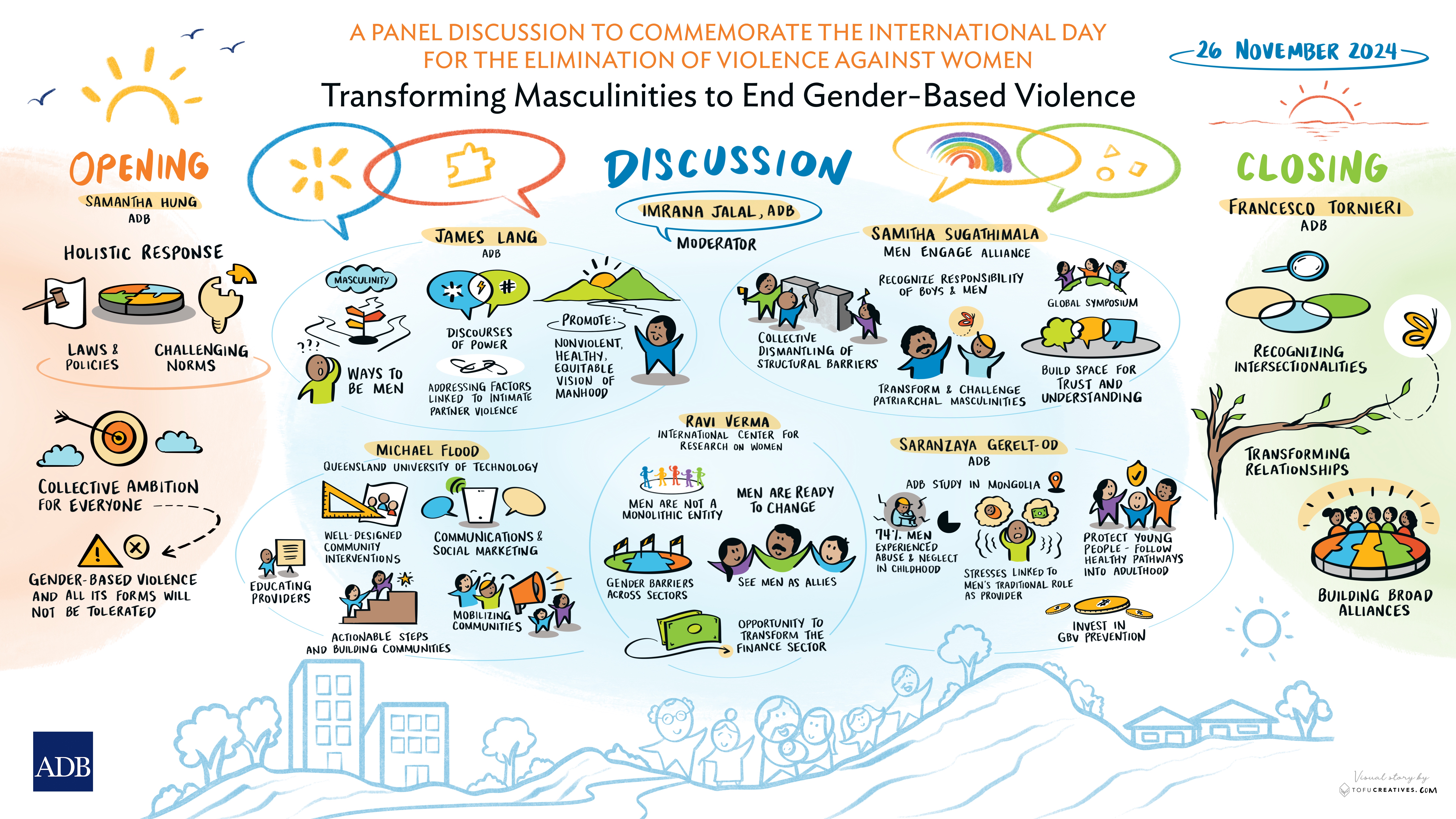Transforming Masculinities to End Gender-Based Violence A Panel Discussion to Commemorate the International Day for the Elimination of Violence against Women (IDEVAW)
Men and boys are central to the changes necessary for ending gender-based violence (GBV). These changes include difficult transformations: men changing deeply entrenched behaviors and the social norms that support them, re-balancing power in intimate and social relationships, change in institutional cultures and how economies are organized to privilege men. Men and boys can be engaged in meaningful ways in these changes at different times in their lives and in different roles: as policy makers, community leaders, senior management and business owners, as well as co-workers, neighbors, partners, friends and family members.
As a driver for these different changes, an overarching goal for sustained GBV prevention is re-defining masculinity or “ways of being a man”. Masculinities are different definitions of what it means to be a man in different cultural contexts around the world. The plural form “masculinities” conveys that there are many possibilities for being a man and that these can change over time and from place to place. The most celebrated and pervasive versions of masculinity are often associated with men being powerful, successful, heterosexual and in control. This can translate as men’s control over women, their autonomy and their bodies. GBV, or the threat of such violence, is used to maintain this sense of control and power. GBV can also be used to reassert men’s sense of control, especially when men are marginalized, threated or under stress themselves. The opportunities to work with boys and men in transformative ways - while simultaneously working with women, girls, marginalized groups and gender non-conforming people - often include building on men’s own experiences with marginalization to inspire empathy. There is also growing recognition of the need to actively involve not only individual men, but households, communities and institutions in efforts to transform masculinities and address GBV. Strategies such as couples’ interventions, community mobilization and school-based approaches have potential to include women, men and all members of society more systematically in change processes.
ADB’s Gender Equality Division (CCGE), is commemorating IDEVAW by organizing an event on “Transforming Masculinities to End Gender-Based Violence”, in collaboration with the Human and Social Development Sector Group (SG-HSD) on 26 November 2024 to discuss the issues, challenges and ways forward to work with boys and men to promote healthy and non-violent masculinities. The hybrid event format will center around a moderated panel discussion, with each panelist responding to questions on topics including the challenges and promise of interventions to transform masculinities to end GBV, the 2024 ADB-supported research on men and masculinities in Mongolia, the work of the International Center for Research on Women and the MenEngage Global Alliance as well as concrete insights and recommendations for ADB operations. This will be followed by discussion and questions and answers with the audience.
Visual Summaries

| Date | Session / Activity | Presentation Material | Speaker(s) |
|---|---|---|---|
| 26 Nov 2024 | 1:30–1:40 p.m. | Welcome | Samantha Hung, Director,Gender Equality Division, Climate Change and Sustainable Development Department (CCSD), Asian Development Bank (ADB) |
| 26 Nov 2024 | 1:30–1:40 p.m. | Opening Remarks | Yolanda Fernandez Lommen, Advisor, Climate Change and Sustainable Development Department, ADB |
| 26 Nov 2024 | Moderated Panel: Transforming Masculinities to End Gender-based Violence | ||
| 26 Nov 2024 | 1:40–2:30 p.m. | Moderator: Imrana Jalal,Special Project Facilitator,Office of the Special Project Facilitator (OSPF), ADB | |
| 26 Nov 2024 | All Panel Speakers are Confirmed Michael Flood and Samitha Sugathimala will participate via Zoom | Panelists | |
| 26 Nov 2024 | All Panel Speakers are Confirmed Michael Flood and Samitha Sugathimala will participate via Zoom | Engaging Men and Transforming Masculinities to Achieve Gender Equality and Women’s Empowerment: A Stocktaking of Initiatives in South Asia (SG-HSD paper) | Ravi Verma, Regional Director, Asia Regional Office, International Center for Research on Women |
| 26 Nov 2024 | All Panel Speakers are Confirmed Michael Flood and Samitha Sugathimala will participate via Zoom | “The evidence that working with boys and men can work, but sometimes does not” | Michael Flood, Professor, School of Justice, Queensland University of Technology, Australia |
| 26 Nov 2024 | All Panel Speakers are Confirmed Michael Flood and Samitha Sugathimala will participate via Zoom | “The priorities and commitments of the MenEngage Global Alliance” | Samitha Sugathimala,Co-Chair, MenEngage Global Alliance |
| 26 Nov 2024 | All Panel Speakers are Confirmed Michael Flood and Samitha Sugathimala will participate via Zoom | “Findings from the Men’s Health and Safety Survey in Mongolia” | Saranzaya Gerelt-Od, Senior Gender Officer Mongolia Resident Mission, ADB |
| 26 Nov 2024 | All Panel Speakers are Confirmed Michael Flood and Samitha Sugathimala will participate via Zoom | Discussant: James Lang, Senior Gender Specialist (Gender Based Violence), Gender Equality Division, Climate Change and Sustainable Development Department, ADB | |
| 26 Nov 2024 | 2:30–2:55 p.m | Q&A | |
| 26 Nov 2024 | 2:55–3:00 p.m. | Closing Remarks | Francesco Tornieri, Principal Social Development Specialist (Social Inclusion) Human and Social Development Sector Office, ADB |
